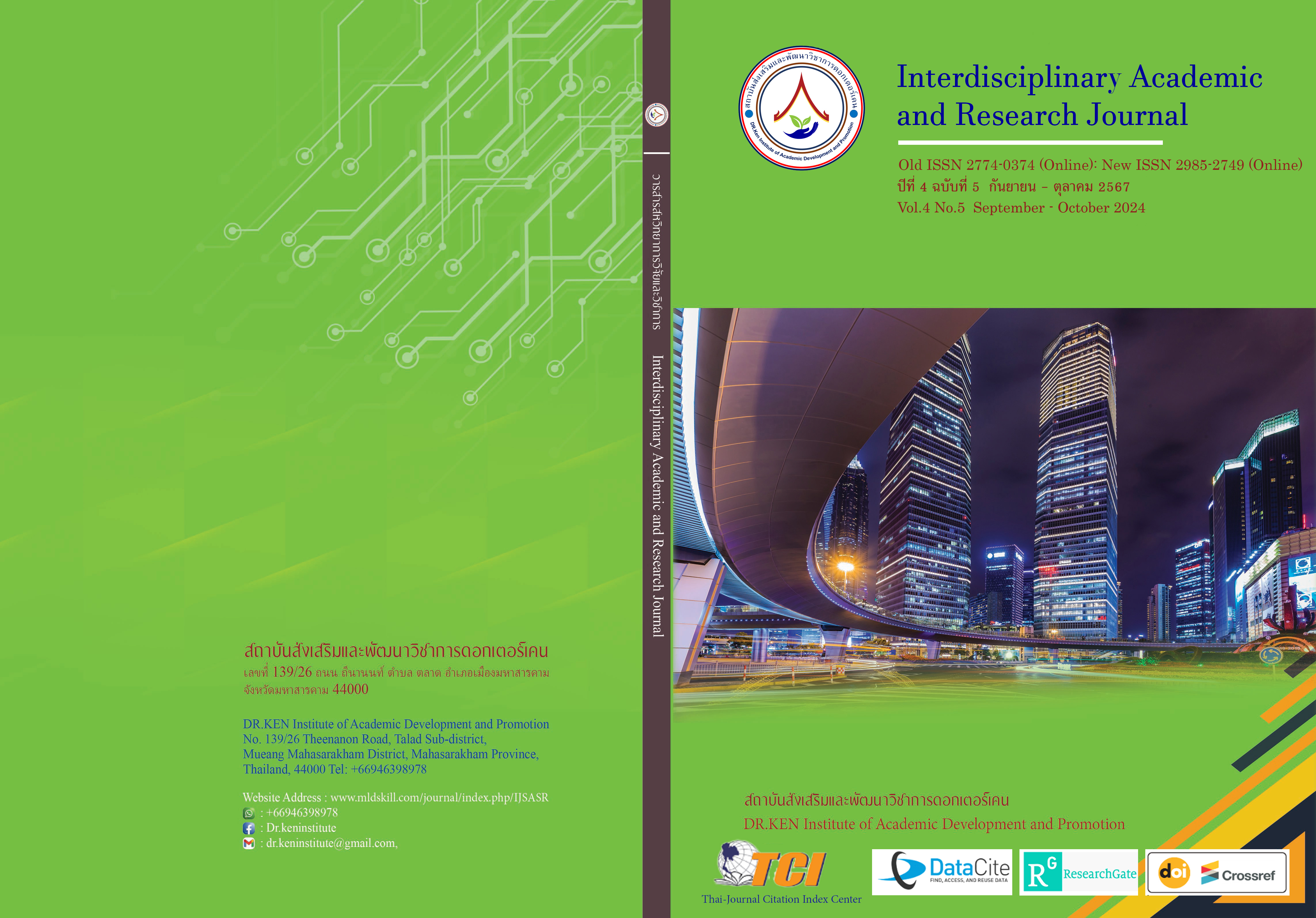Legal Measures for Protecting unborn Infants of Drug - addicted Mothers
DOI:
https://doi.org/10.60027/iarj.2024.277911Keywords:
Unborn Infants; , Drug-addicted Mother; , Pro-life; , Pro-choiceAbstract
Background and Aims: The health of the unborn child of a drug addict mother will impact the fetus. Medical research findings suggest that drugs induce psychosis in fetuses, and impact the brain and nervous system, resulting in early birth, incapacity, and physical or mental impairment, as well as miscarriage or death. Pro-life beliefs hold that babies should be safeguarded while they are still inside their mothers. This research has the following objectives: 1) to study the principles and the concept of protecting the fetus of drug-addicted mothers Addiction 2) to study international law Foreign and Thai laws related to infant protection in the womb of drug-addicted mothers 3) to study and analyze legal problems regarding the protection of fetuses of drug-addicted mothers 4) To propose solutions to improve laws regarding the protection of fetuses of mothers addicted to drugs.
Methodology: This research was conducted in qualitative research. By researching documents, namely Thai law, foreign law, and international law. As well as study judgments, textbooks, books, theses, dissertations, articles, online journals, and newspapers. Electronic media and websites in addition, to field data were studied with in-depth interviews. From a population of people with knowledge and expertise, a specific in-depth interview population group will interview the population involved, namely a group of law enforcement officers, 3 people, a group of medical personnel, 4 people, and a group of psychologists. There were 3 social workers. All data were then analyzed and synthesized according to the research process and then described descriptively.
Results: (1) There are two principles and concepts related to the protection of fetuses of drug-addicted mothers: concepts under the philosophy of natural law; that support life (Pro-Life) by seeing that the fetus in the mother's womb is protected according to human rights principles as for the second concept, it is a concept under the Office of Public Law. It is seen that the fetus in the mother's womb does not yet have legal personality status. Only mothers have the right to choose according to the principle of pro-choice (pro-choice). (2) From a comparative study of Thai and foreign laws regarding the protection of fetuses of mothers addicted to drugs, it was found that the French Republic does not recognize personal status. of the fetus in the mother's womb and tends to be the main support (Pro - choice) like in Thailand. But the laws of the United Kingdom, United States, Federal Republic of Germany Adhering to the principle of pro-life (Pro-life) or “Born Alive Rule” ensures that babies in the womb of their mothers are protected according to human rights principles. Especially United States law. Specific laws have been enacted to protect fetuses of mothers who use drugs. (3) Thailand has four important legal problems regarding fetuses of mothers addicted to drugs: first the lack of personal status of fetuses results in them not being protected according to human rights principles. Second, the asymmetry of the laws regarding the protection of mother's rights in the Constitution is consistent with the pro-choice concept. This is contrary to the pro-life concept. Third, the right of doctors to examine the health of fetuses goes against the rights of mothers which are protected by the Constitution and there is no law to protect doctors. Fourth, Thailand has no law to protect infants in specific maternal pregnancies The researcher therefore made a suggestion. Improve the law to protect fetuses of mothers addicted to drugs according to the principle (Pro-Life) by proposing amendments to the National Health Act of 2007 and drafting ministerial regulations on medical measures for examining and treating fetuses in mothers' wombs. who are addicted to drugs, B.E. ... to provide protection for their life’s health protection Fetus in the womb of a drug-addicted mother and protect doctors under the principles of the United Nations Universal Declaration of Human Rights.
Conclusion: The Pro-Life stance, which supports fetal rights based on human rights principles, and the Pro-Choice stance, which prioritizes the mother's rights and does not recognize fetal legal personality, are two opposing principles regarding the protection of fetuses of drug-addicted mothers. These principles are highlighted in the study. It suggests that Thailand enact pro-life measures, such as changing the National Health Act and enacting new rules, in order to safeguard fetuses and the medical personnel who treat them.
References
กรมราชทัณฑ์ (2565), สถิติผู้ต้องขังกลุ่มพิเศษ ประจำปี พ.ศ.2565. Retrieved from: https://opendata.nesdc.go.th/dataset/statistics-of-special-groups-of-prisoners.
กุลธิดา ศรีวิเชียร. (2563). การขับเคลื่อนนโยบายสิทธิทางด้านสุขภาพของเด็กติดผู้ต้องขังหญิงในประเทศไทย. วารสารสังคมสงเคราะห์ศาสตร์, 28 (1), 25-62.
คณะกรรมการสิทธิมนุษยชนแห่งชาติ. (2550). ปฏิญญาสากลว่าด้วยสิทธิมนุษยชน Universal Declaration of Human Rights, กรุงเทพมหานคร: สำนักงานคณะกรรมการสิทธิมนุษยชนแห่งชาติ,
จุฑารัตน์ ชัยวีรพันธ์เดช และสิวิลักษณ์ กาญจนบัตร (2559), ผลกระทบต่อทารกจากมารดาที่ใช้สารเมทแอมเฟตามีนก่อนคลอด. วชิรเวชสารและวารสารเวชศาสตร์เขตเมือง, 60(1), 53-64
นิตยา จงแสง (2559), การรับรองคุ้มครองศักดิ์ศรีความเป็นมนุษย์ : ศึกษากรณีการกำหนดสถานะของสภาพบุคคล. วิทยานิพนธ์นิติศาสตรมหาบัณฑิต จุฬาลงกรณ์มหาวิทยาลัย
วิภาพร เนติจิรโชติ. (2559). มาตรการที่เหมาะสมทางกฎหมายกับการทำแท้ง. ดุษฎีนิพนธ์ดุษฎีบัณฑิต คณะนิติศาสตร์ มหาวิทยาลัยธุรกิจบัณฑิตย์
สำนักบริหารการสาธารณสุข สำนักงานปลัดกระทรวงสาธารณะสุข กระทรวงสาธารณสุข. (2557). คู่มือช่วยเหลือผู้หญิงตั้งครรภ์ไม่พร้อมของศูนย์พึ่งได้. หนังสืออิเล็กทรอนิกส์. สำนักบริหารการสาธารณสุข สำนักงานปลัดกระทรวงสาธารณะสุข
Nabundhit, S., Wongpornpavan, C., Thongpan, S., & Leeka, J. (2021). A PHILOSOPHY OF THE NATURAL LAW WHICH INFLUENCE ON THE CONSTITUTION OF THE KINGDOM OF THAILAND B.E.2560. Journal of Graduate MCU KhonKaen Campus, 8(4), 160–173. Retrieved from https://so02.tci-thaijo.org/index.php/jg-mcukk/article/view/252592
Downloads
Published
How to Cite
Issue
Section
License
Copyright (c) 2024 Interdisciplinary Academic and Research Journal

This work is licensed under a Creative Commons Attribution-NonCommercial-NoDerivatives 4.0 International License.
Copyright on any article in the Interdisciplinary Academic and Research Journal is retained by the author(s) under the under the Creative Commons Attribution-NonCommercial-NoDerivatives 4.0 International License. Permission to use text, content, images, etc. of publication. Any user to read, download, copy, distribute, print, search, or link to the full texts of articles, crawl them for indexing, pass them as data to software, or use them for any other lawful purpose. But do not use it for commercial use or with the intent to benefit any business.
















.png)


